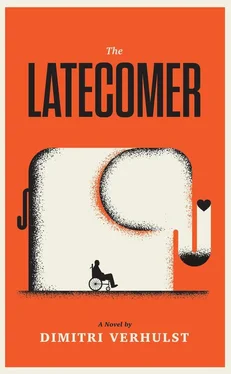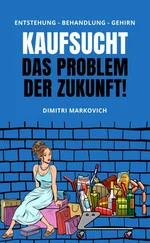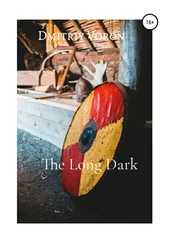Although she was already having the greatest difficulty keeping a grip on herself, I looked my daughter in the eye and said,
‘You don’t think I’m going to fall for that, do you?’
‘What do you mean, Father?’
‘What do I mean? That I’m smarter than you think, that’s what I mean!’
‘Just tell me. What’s wrong?’
‘Take a look at the car, Charlotte! What do you see?’
‘I don’t see anything.’
‘You don’t see anything, you say. Look closer!’
‘I don’t see anything, Dad, really I don’t. Come on, tell me. What am I supposed to see?’
‘The caravan! It hasn’t been hitched on yet. We almost set off without it again!’
His heart wasn’t really in it, but in the end Hugo gave in to his sister’s demands and hitched the caravan onto the car. Plus the towing mirrors — to avoid accidents! And when, after many delays, we finally left, I said to Charlotte:
‘Look at all the neighbours out gawking at us! They’re green with envy. Go on, give ’em a toot.’
And, encouraged by that mischievous honking, I wound down my window and waved wildly all the way down Azalea Street. Whereupon someone, three guesses who (first name rhymes with ‘pique’, surname with ‘fetter’), said:
‘He may be soft in the head but at least he’s not suffering.’

I’m crossing the Styx and taking: a tube of toothpaste (just for a joke), a stray Joseph Roth quote, the wondrous memory of an ardent kiss I never got, bread crumbs, greater solace than a good Berliner ever offered me, a stanza of ‘Auntie Bonanza’, the longing for a T-shirt emblazoned with the WORDS LIFE BEGINS AT SEVENTY-FOUR …

So, this is it then, my hard-won terminus: a tiny room four metres by five — something like that, obviously I haven’t measured it. At first I was offended by the shabby furniture Moniek had filled it with. She simply couldn’t forgive me for forgetting her, so much so that it was now futile for me to search my mental catacombs for her name. Worse still: according to my seemingly ailing brain, this lady who claimed to be married to me had never even existed. And for that she was making me suffer with a cheap mattress and a tiny, obsolete TV.
My wardrobe: a dilapidated, wobbling monster that had only found a buyer in the form of my wife after a month-long expedition from flea market to flea market. I had forfeited the right to quality and it was obviously no longer worth investing in my comfort.
‘Why put money into a new, solid wardrobe? It’s not as if he’d even notice the difference!’
The beauty of an austere interior was something Moniek had never grasped, which explained why she had felt the compulsion to fill every square millimetre in Azalea Street with vases, peacock feathers, clocks and suchlike. This time she demonstrated her fear of empty spaces by cramming as many picture frames as humanly possible into my small and already claustrophobic room. And in those frames: pictures of herself! Moniek with her husband. Moniek with her children. Moniek with her husband and her children. Moniek solo. And not a single spontaneous snap in the whole collection. The ice queen of the pose preferred her portraits in a setting of flowers or shrubs. She also had the peculiar tic of needing to touch those flowers or shrubs for the camera. It resulted in highly ridiculous photos: a woman with a smile picked up from a toothpaste advertisement, standing there as stiff as a plank and staring into the lens while simultaneously palpating a hydrangea.
Photo sessions with Moniek were a torment for the whole family. She ordered everyone around, telling them where and how to stand. And she’s definitely not one for practical jokes. When the kids were still little and enjoyed poking their tongues out or playfully crossing their eyes at the camera, their mother saw it as a vulgar assault on her personal well-being.
‘Is this how you want to go down in history? As a cross-eyed otter? Come on, tuck in that shirt and stop looking like a freak! One, two, three and smiley smiles!’
That was her slogan: ‘Smiley smiles.’
Everyone always had to grab hold of each other too, during those supposed immortalisations of hers. The few times she laid an arm around my shoulders was for the camera. The assigned photographer had to accept her commands too. Whether or not to use the flash, which angle, which clouds and pine trees to include in the shot, if and where exactly our legs should be cut off: she decided everything and woe betide anyone who dared to flout her instructions. And as if magnesium was still being used to reduce the exposure time, as if it wasn’t just an ordinary family member standing there with an ordinary camera but Diego Velázquez with a freshly stretched canvas, she decreed that all present remain motionless until the image had been captured. ‘Hold your breath, don’t move!’
Digital photography was one advance too many as far as I was concerned. Because from that moment on Moniek could immediately check the results of each photo shoot. And discover that they needed to be improved upon. The candles on my antepenultimate birthday cake, for instance, had to be blown out and relit no less than nine times, by me, before she gave her imprimatur to the photographic record of that hardly historic occasion.
So obviously I was far from happy with all that staged family bliss hanging in my room. One of the first times Moniek came to visit me she discovered that I had removed all, and I mean all , of the photos from their frames and replaced them with pictures and advertisements torn out of old magazines. Where previously my wife had stood below the Eiffel Tower with a handbag clamped under one arm, there was now a photo of a discount prosciutto, just €19.99 a kilo. I replaced the portraits of our grandchildren — correction, the portraits of Moniek with our grandchildren — with newspaper photos of car crashes, and our wedding photo made way for an aerial shot of a South American slum. The head nurse had to console her, insisting that no matter how you looked at it, you couldn’t say her husband was comparing her to a leg of ham. Not exactly. It was in the nature of my disease to manifest itself as a series of unpredictable fancies. There was no reasoning behind my actions, they were the empty deeds of a man who has lost the blueprints to his own soul.
The head nurse had put it beautifully. Bravo.
Even more disgraceful than all those lying photos were the religious symbols Moniek had catapulted into my existence in extremis . A crucifix over my bed, just imagine! ‘It can’t do any harm!’ she said. And on my old-fashioned bedside cabinet she planted a monstrous statue — bisque, I think — of Rita of Cascia, patron saint of hopeless cases. Maybe Moniek was guilty of stupidity rather than malice and simply suffered from a conviction that idolatry was part and parcel of being in a home. But a person — and I’m talking about myself here — who grew up in a society in which religion went unquestioned and considers his agnosticism an achievement, the product of deep and courageous thought, can only feel ridiculed by having the label ‘Catholic’ stuck to his forehead. I felt philosophically swindled by my lawfully wedded wife and regretted not being able to step out of character for a minute to point this gruesome misrepresentation out to Winterlight’s nursing staff. It annoyed me immensely, being henceforth noted down on death’s waiting list as a believer. The first rattle in my throat or tiniest bit of coughed-up blood will have a priest scurrying to my bedside with a breviary and an aspergillum. I feel like crawling away in shame at the thought of almost certainly having a church funeral.
Читать дальше













